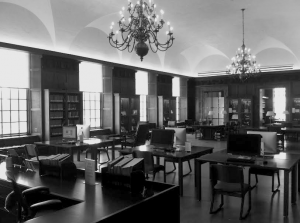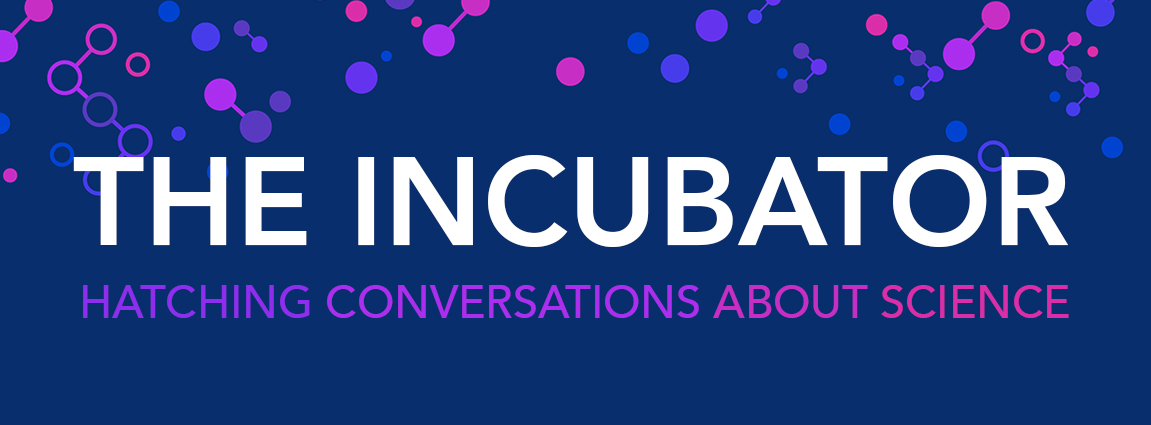The Future of the Library
By John Borghi
I work in an academic library, the Rita and Frits Markus Library at Rockefeller University, but I am not a librarian. I attend weekly lab meets, keep track of the latest developments in research methodology, and read academic journals; I am a scientist, but I am also part of the latest transformation of the academic library. According to my business cards I am a science informationist. It is my job to both proactively bring the information tools available through my library out the research community and using my experience in science to translate the information needs of the research community back to the library. In my own small way, I am thus contributing to the latest transformation of the library- from a repository of books and periodicals to an active partner in the research process.

I started as informationist the week after I completed a PhD in neuroscience. However, though this is my first job out of graduate school, it is not my first in a library. When I was fifteen years old, I worked as a page in The Morse Institute Library– the public library of my hometown. It was there that I acquired the only experience with traditional library activities- processing periodicals, shelving books, managing a circulation desk- that I would bring to my job at Rockefeller. Working in two very different types of libraries, at two very different periods of time, has given me a unique position to both observe how libraries have already changed and to make some predictions about the libraries of the future.
The most noticeable change in libraries, both public and academic, has been physical. A massive renovation and modernization at the Morse Institute Library, designed to accommodate a growing use of technology and desire for public meeting spaces, preceded my work there by several years. Similarly, a renovation and restoration at the Markus library, designed to reflect the library’s status as a center of campus life and the ascent of electronic resources, was completed mere months before I started. In public and academic libraries alike, technology and electronic resources have significantly altered the physical space.
Especially in academic libraries, the importance of large print collections appears to be waning, a trend that is unlikely to reverse. In many academic libraries, collections of print journals have already been largely discarded. The library of the future will likely not be completely devoid of books, but the size of print collections will be greatly diminished. Instead of large stacks, the library of the future’s print collection will consist of a relatively small number of special, historically important, documents. Space once devoted to textbooks, edited collections, and scientific books will be re-appropriated to fit banks of computers, group work areas, and technology training rooms.

Alongside these changes to the library’s physical space, will be a concurrent change in library services. When I first worked in a library, the position of informationist did not exist. Though the position remains relatively uncommon, the types of services offered by an informationist are already increasingly offered by academic libraries. The library of the future will likely feature more staff members that resemble informationists than those that resemble the librarians of today. Future library staff will offer services outside the library’s physical space; they will offer training, the will offer dynamic and proactive information services, they will be fixtures of the laboratory. The library of the future will offer services tailored to the needs of individual laboratories and researchers. Rather than simply storing information, the library of the future will curate. Services will focus on assisting researchers navigate the increasingly overwhelming streams of information offered by both traditional academic publications and emerging “alternative” resources such as blogs and social media. Future library staff members will use their subject knowledge to assist in reference discovery and management, perhaps even data discovery and management. They will be scientists as well as librarians.
I believe in libraries. I believe a space where people can gain, exchange, and integrate information is an essential feature of any community, academic or otherwise. But I also believe that, as the methods for disseminating information have changed, so have the needs of library patrons. As someone who once spent hours in working in the stacks, I may be sad to see physical books discarded in favor of electronic resources, but I also recognize that the change is necessary. As someone who works in a classically elegant library space, I may sometimes regret the amount of time I spend behind a computer screen, but I also acknowledge that my library’s resources are primarily accessed electronically. I believe the library of the future will look significantly different than the library of today, but I think that is a good thing.

Some very informative comments made elsewhere on the web have raised some points I’d like to mention here.
1. A lot of the services I mention in this post are already being offered by academic libraries. Perhaps I should have framed this post as “The Library of the Present” rather than “The Library of the Future”.
2. A few people have pointed out that many librarians consider themselves informationists. When I mentioned the relative infrequency of informationists, I was referring specifically to science informationists. As far as I am aware, there aren’t a lot of people with the title of science informationist currently. There are, I should note, a lot of library people who do things very similar to what I do, they just have a different title.